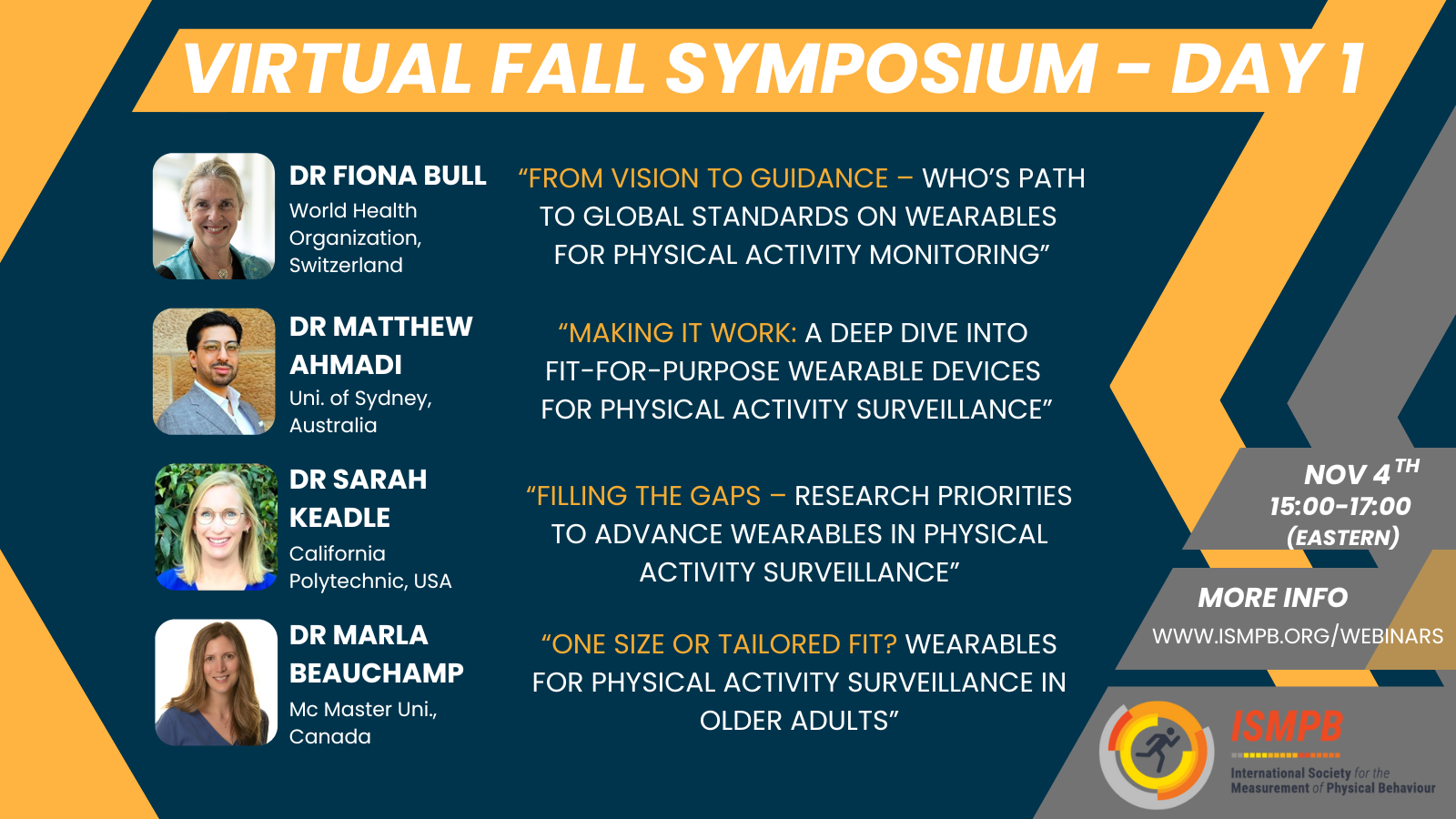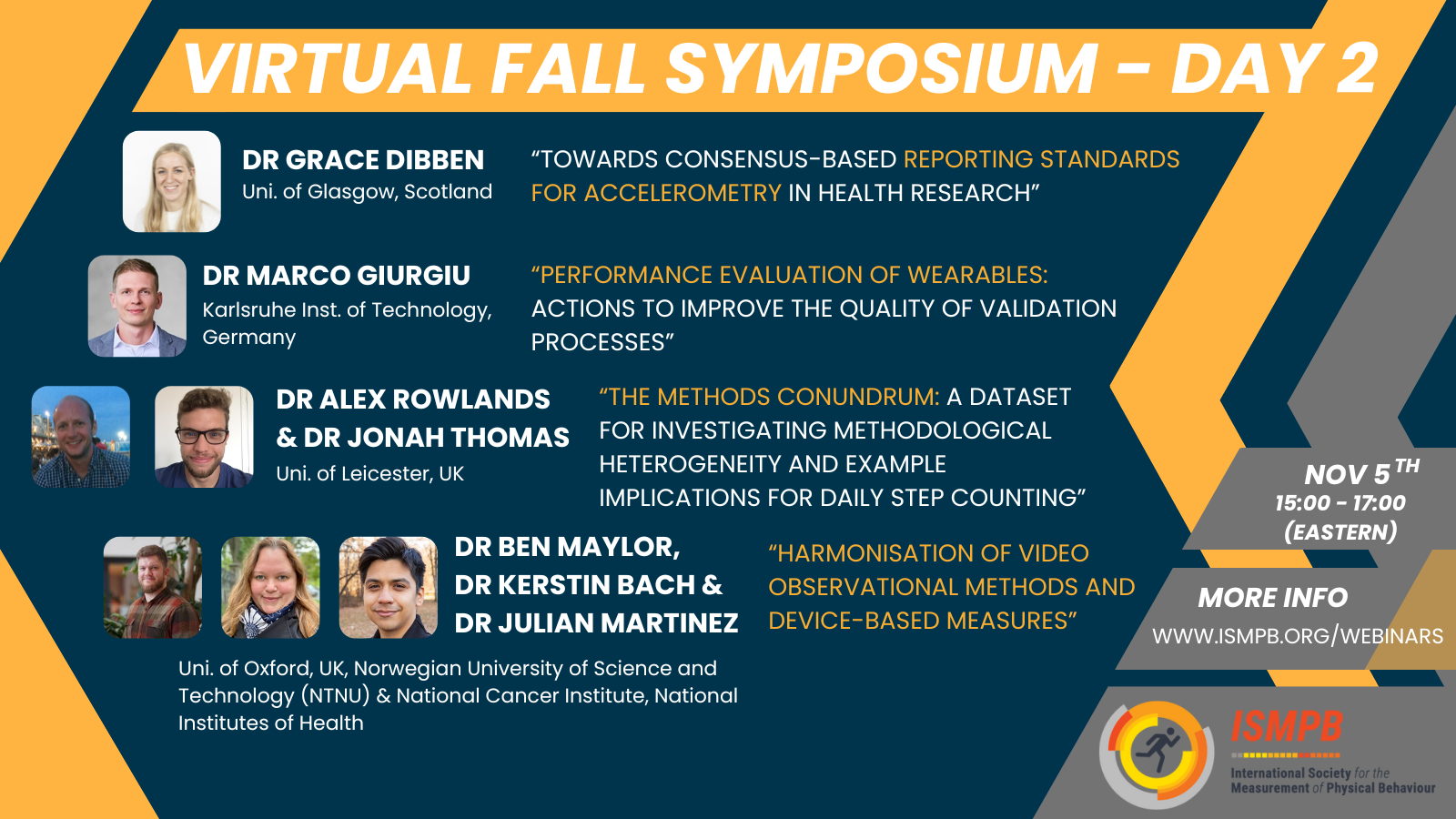Webinars
Upcoming Webinars
To focus on continuing to connect our community, ISMPB will be supporting various webinars throughout the year. These webinars have been created to offer insight to our community. If you have any suggestions for webinars that may be of interest, please contact us.
Past Webinars
DAY 1
Developing a Global Guidance on the use of Wearable Devices for National Monitoring of Physical Activity
From Vision to Guidance
WHO’s Path to Global Standards on Wearables for Physical Activity Monitoring
Fiona Bull
World Health Organization, Switzerland
Speaker Bio
Dr Fiona Bull is Head of the Physical Activity Unit in the Department of Health Promotion at the World Health Organization (WHO) Headquarters in Geneva, Switzerland. Dr Bull leads a team supporting all countries to increase participation in physical activity through advancing science and translation of knowledge into policy and practice. Dr Bull led the development of the WHO Global Action Plan on Physical Activity 2018-2030: More active people for a healthier world, the updating of the Global guidelines on physical activity and sedentary behaviors in 2020 and the development of the monitoring framework for tracking global progress and publication of the first Global Status Report on Physical Activity in 2022.
Prior to joining WHO in 2017, Dr Bull was Professor of Public Health and Physical Activity and held positions as Director of the Centre on Built Environment and Health at the University of Western Australia, in Perth Western Australia and previously Professor of Physical Activity and Director of the National Centre of Physical Activity at Loughborough University in the UK.
Dr Bull is a Member of the International Olympic Committee Medical and Scientific Commission and the Sustainability and Legacy Commission. Dr Bull was President of the International Society of Physical Activity and Health from 2014-2016 and has co- authored over 240 scientific publications and received recognition as highly cited academic by Clarivate in various fields in 2020, 2022, 2023 & 2024. Fiona continues to contribute to advancing science and applications of innovative digital technologies to improve policy and practice and the work across many sectors and stakeholders to help enable more people to be more active and healthier. To stay active, she is a keen swimmer, cyclist, hiker and dog walker.
Making it work
A deep dive into fit-for-purpose wearable devices for physical activity surveillance
Matthew Ahmadi
University of Sydney, Australia
Speaker Bio
Dr. Matthew Ahmadi is a National Heart Foundation Research Fellow at the University of Sydney’s Charles Perkins Centre in the Faculty of Medicine and Health and the Deputy Director of the Mackenzie Wearables Research Hub. He is a member of the executive board for the International Society of Physical Activity (ISPAH) and Associate Editor of the Journal for the Measurement of Physical Behaviour (JMPB). He is a Working Group member for the Prospective Physical Activity, Sitting, and Sleep Consortium (ProPASS) and the wearables lead for the Australia DETECT Cohort.
Matthew’s research focuses on wearables-based research from development to application in population-based cohorts. He applies wearables- based techniques to measure physical activity, posture, and sleep, and their relationship with cardiovascular disease throughout the lifecourse.
Filling the Gaps
Research Priorities to Advance Wearables in PA Surveillance
Sarah Keadle
California Polytechnic, USA
Speaker Bio
Dr. Sarah Kozey Keadle is an Associate Professor in the Department of Kinesiology and Public Health at California Polytechnic State University, San Luis Obispo. Her research focuses on how different physical activities (e.g. exercise) and sedentary behaviors relate to chronic disease prevention. Dr. Keadle conducts both observational studies to examine the link between these behaviors and health outcomes and intervention studies designed to reduce sitting and increase physical activity. She also has ongoing studies exploring the 1) use of wearable sensors and computer vision to improve the reliability and validity of assessment tools; and 2) development and evaluation of mHealth interventions to reduce sedentary screen time and and increase physical activity.
One Size or Tailored Fit?
Wearables for Physical Activity Surveillance in Older Adults
Marla Beauchamp
McMaster University, Canada
Speaker Bio
Dr. Marla Beauchamp is a physical therapist and Associate Professor in the School of Rehabilitation Sciences and Department of Medicine at McMaster University in Hamilton, Canada. She is also the Director of the McMaster Institute for Research on Aging | Dixon Hall Centre in Toronto. Dr. Beauchamp holds a tier 2 Canada Research Chair in Mobility, Aging and Chronic Disease and an Early Researcher Award from the Ministry of Colleges and Universities.
The overarching aim of Dr. Beauchamp’s research is to identify ways to keep older adults healthy and mobile in their homes and communities for as long as possible. She is leading several major interdisciplinary projects on fall risk assessment and prevention, wearable technology for mobility monitoring, and studies on recovery after COVID-19 and respiratory infection. Internationally, she has contributed to mobility measurement initiatives for the WHO UN Decade of Healthy Aging and the sex and gender working group for the World Falls Guidelines Initiative. She is currently the Wearables Lead for the Canadian Longitudinal Study on Aging and an Associate Editor for Age and Ageing.
DAY 2
From heterogeneity to harmonization and/or standardization: Addressing variability in accelerometer-assessed physical activity methods and outcomes
Towards consensus-based reporting standards for accelerometry in health research
Grace Dibben
University of Glasgow, Scotland
Speaker Bio
Dr Grace Dibben is a post-doctoral researcher in the School of Health and Wellbeing at the University of Glasgow. Her PhD focused on physical activity in people living with heart failure and the impact of cardiac rehabilitation. Since then, she has led multiple Cochrane systematic reviews on exercise-based rehabilitation in coronary heart disease and currently leads an international initiative to develop reporting guidelines for the use of accelerometry in measuring movement behaviours in health research. Her research interests centre on understanding physical activity in clinical populations including coronary heart disease, heart failure, and more recently, multiple long-term conditions, as well as advancing methods to strengthen research quality.
Performance Evaluation of Wearables: Actions to Improve the Quality of Validation Processes
Marco Giurgiu
Karlsruhe Institute of Technology, Germany
Speaker Bio
Dr. Marco Giurgiu is a post-doctoral researcher at the Department of Sport and Sport Science, Karlsruhe Institute of Technology (KIT). During his PhD, he worked intensively on the topic of sedentary behaviour. In particular, his research area comprises examining associations between device-based measured physical behaviour and momentary psychological outcomes by using innovative data collection approaches in real-time (e.g., via smartphone diaries and wearables). The focus is also on just-in-time interventions to integrate sedentary breaks into everyday life. Another area of focus is the measurement of physical behaviour using wearables. Marco Giurgiu’s research particularly addresses the validation of wearables. He is leading the open- science project “Wearable Landscape” (https://wearable-landscape.info/).
The methods conundrum: A dataset for investigating methodological heterogeneity and example implications for daily step counting
Dr Alex Rowlands
University of Leicester, United Kingdom

Dr Jonah Thomas
University of Leicester, United Kingdom
Speaker Bios
Dr. Alex Rowlands is an Associate Professor at the University of Leicester, UK. He leads the AMBer (Assessment of Movement Behaviours) group within the Diabetes Research Centre, which supports disciplines across the University of Leicester to incorporate accelerometry in their research. His research focuses on the measurement and quantification of free-living physical activity, advancement of analytical techniques, and associations of these behaviours with health and physical function. Alex is part of the Wearable Landscape Network, the Prospective Physical Activity, Sitting, and Sleep Consortium (ProPASS), and Associate Editor of the Journal for the Measurement of Physical Behaviours.
Dr. Jonah Thomas is a research associate at the Leicester Diabetes Centre, UK. His research focuses on how data can be used to understand and improve the lives of individuals living with diabetes. Particularly, his work looks to combine data from continuous glucose monitors with data from physical activity monitors to understand the relationship between exercise and glucose control. Since his PhD, Jonah has had an interest in quantifying human movement and the challenges this presents. Jonah is part of the AMBer (Assessment of Movement Behaviours) group at the Diabetes Research Centre.
Harmonisation of video observational methods and device-based measures

Dr Ben Maylor
University of Oxford, United Kingdom

Dr Kerstin Bach
Norwegian University of Science and Technology (NTNU)

Dr Julian Martinez
National Cancer Institute, National Institutes of Health
Speaker Bios
Dr Ben Maylor is a researcher in the Wearables Group at the Big Data Institute and the Nuffield Department of Population Health, University of Oxford. His work focuses on developing methods to derive meaningful insights from wearable device data to better understand how 24-hour movement behaviours contribute to the prevention and management of chronic disease.
Kerstin Bach is a professor of AI at the Norwegian University of Science and Technology (NTNU) and Research Director at NorwAI. Her research focuses on AI-driven decision support, intelligent sensing, and knowledge management, with a strong emphasis on healthcare applications. She has led interdisciplinary projects funded by the Norwegian Research Council, NTNU and was the project manager of the EU H2020 project selfBACK, which developed AI-based personalized self-management support for patients with lower back pain. Moreover, Kerstin has been leading the work on developing Machine Learning models for Human Activity Recognition. Those models are currently used the analyse the physical activity recordings in the Norwegian HUNT study.
Before joining NTNU’s computer science department, she researched at the German Research Center for AI (DFKI) and later at Verdande Technology, developing real-time case-based reasoning (CBR) solutions for oil and gas, financial services, and healthcare. She played a key role in developing myCBR, an open-source CBR tool widely used in research and industry.
Through her roles at NorwAI and her involvement in the Norwegian Open AI Lab, she fosters collaboration between academia and industry, engaging in public discussions on AI research and its impact.
Dr. Julian Martinez is a postdoctoral fellow within the Cancer Prevention Fellowship Program at the National Cancer Institute, National Institutes of Health. His research focuses on advancing physical activity methodologies, examining causal pathways between physical activity, physical function and health, and conducting mixed-methods research to supplement community-based interventions.
Virtual Fall Symposium
Session 1: Academic and multi-industry collaboration: Learnings from the Mobilise-D project
Beatrix Vereijken, NTNU & Dan Rooks, Novartis
Session 2: From Research to Reality: Sensor Technology in Industry
Bridging academia and industry: experiences from a hybrid research journey
Miriam Cabrita, Fibion
Digital Measures in Drug Development: A Journey Towards Fit-for-Purpose, Inclusive, and Patient-Centered Solutions
Kate Lyden, VivoSense
Originally Presented on November 12th, 2024
Presentations by ActiGraph & activPAL


Speaker BIOS
 Beatrix Vereijken is Professor at the Department of Neuromedicine and Movement Science, Norwegian University of Science and Technology (NTNU), Trondheim, Norway, and the Academic Lead for the work on communication, dissemination and exploitation of results in the Mobilise-D project. She also co-coordinated the EU-project PreventIT, a personalised health and ICT project aimed at preventing functional decline at older age. She is the Academic Director of NeXt Move, the Medical Faculty’s core facilities for neurophysiology, exercise physiology, movement and elite sports at NTNU. She holds an MSc in Experimental Psychology from the Radboud University Nijmegen and a doctorate in Human Movement Science from the Vrije Universiteit Amsterdam. Her research focuses on mobility across the lifespan, active ageing, activity monitoring, and the development and implementation of health technology.
Beatrix Vereijken is Professor at the Department of Neuromedicine and Movement Science, Norwegian University of Science and Technology (NTNU), Trondheim, Norway, and the Academic Lead for the work on communication, dissemination and exploitation of results in the Mobilise-D project. She also co-coordinated the EU-project PreventIT, a personalised health and ICT project aimed at preventing functional decline at older age. She is the Academic Director of NeXt Move, the Medical Faculty’s core facilities for neurophysiology, exercise physiology, movement and elite sports at NTNU. She holds an MSc in Experimental Psychology from the Radboud University Nijmegen and a doctorate in Human Movement Science from the Vrije Universiteit Amsterdam. Her research focuses on mobility across the lifespan, active ageing, activity monitoring, and the development and implementation of health technology.
 Daniel Rooks is Head of Endpoint Management in Translational Medicine Discovery and Profiling at Novartis, Cambridge, MA, USA, and the Industry Co-Lead in the Mobilise-D project. Dan’s work focuses on developing and applying ways to reduce variability and improve data quality in clinical outcome assessments of patient function in drug development clinical trials. Prior to his current role, he led the Muscle Diseases and Neuromuscular Diseases groups and was the Early Clinical Lead of the Bimagrumab program. His work with assessments in clinical trials at Novartis and before that at Harvard Medical School include traditional pen, paper, stopwatch and digital measures. Dan co-developed the SPPB Guide mobile phone app that standardizes administration of the Short Physical Performance Battery. He is a fellow of the American College of Sports Medicine.
Daniel Rooks is Head of Endpoint Management in Translational Medicine Discovery and Profiling at Novartis, Cambridge, MA, USA, and the Industry Co-Lead in the Mobilise-D project. Dan’s work focuses on developing and applying ways to reduce variability and improve data quality in clinical outcome assessments of patient function in drug development clinical trials. Prior to his current role, he led the Muscle Diseases and Neuromuscular Diseases groups and was the Early Clinical Lead of the Bimagrumab program. His work with assessments in clinical trials at Novartis and before that at Harvard Medical School include traditional pen, paper, stopwatch and digital measures. Dan co-developed the SPPB Guide mobile phone app that standardizes administration of the Short Physical Performance Battery. He is a fellow of the American College of Sports Medicine.

Miriam Cabrita holds a PhD in Biomedical Engineering from the University of Twente (the Netherlands). Completing her PhD as an external student, Miriam has always balanced her work between academia and industry. In 2021, she fully transitioned out of academia. For over a decade, her research focused on developing personalized digital health solutions to promote physical activity and prevent chronic diseases.
Currently, Miriam serves as Chief Customer Officer at Fibion Inc., a health tech company specializing in objective measurement of physical activity, sedentary behavior, and sleep. In parallel, she is a Researcher and Project Manager at SHINE 2Europe, working on the development of inclusive and person-centred digital health solutions.
 Kate Lyden, PhD is the Chief Science Officer for VivoSense, a science and analytics company that develops and validates digital clinical measures and provides end-to-end services for their delivery in regulated clinical trials. In this role, Kate leads a diverse team of clinical scientists, data scientists, signal processors, qualitative and mixed methods scientists, and clinical trial operations professionals to build novel digital endpoints and biomarkers, and provide pharmaceutical sponsors with expert operational execution for their implementation in all phases of clinical drug development. Kate has an extensive and diverse background in the development and implementation of wearable sensor methodologies across clinical, academic, and industry settings. Her research has focused on synchronizing continuous measures of real-world physical behavior with physiological signals and patient reported outcomes to build contextually rich datasets that inform patient focused drug development and clinical care.
Kate Lyden, PhD is the Chief Science Officer for VivoSense, a science and analytics company that develops and validates digital clinical measures and provides end-to-end services for their delivery in regulated clinical trials. In this role, Kate leads a diverse team of clinical scientists, data scientists, signal processors, qualitative and mixed methods scientists, and clinical trial operations professionals to build novel digital endpoints and biomarkers, and provide pharmaceutical sponsors with expert operational execution for their implementation in all phases of clinical drug development. Kate has an extensive and diverse background in the development and implementation of wearable sensor methodologies across clinical, academic, and industry settings. Her research has focused on synchronizing continuous measures of real-world physical behavior with physiological signals and patient reported outcomes to build contextually rich datasets that inform patient focused drug development and clinical care.
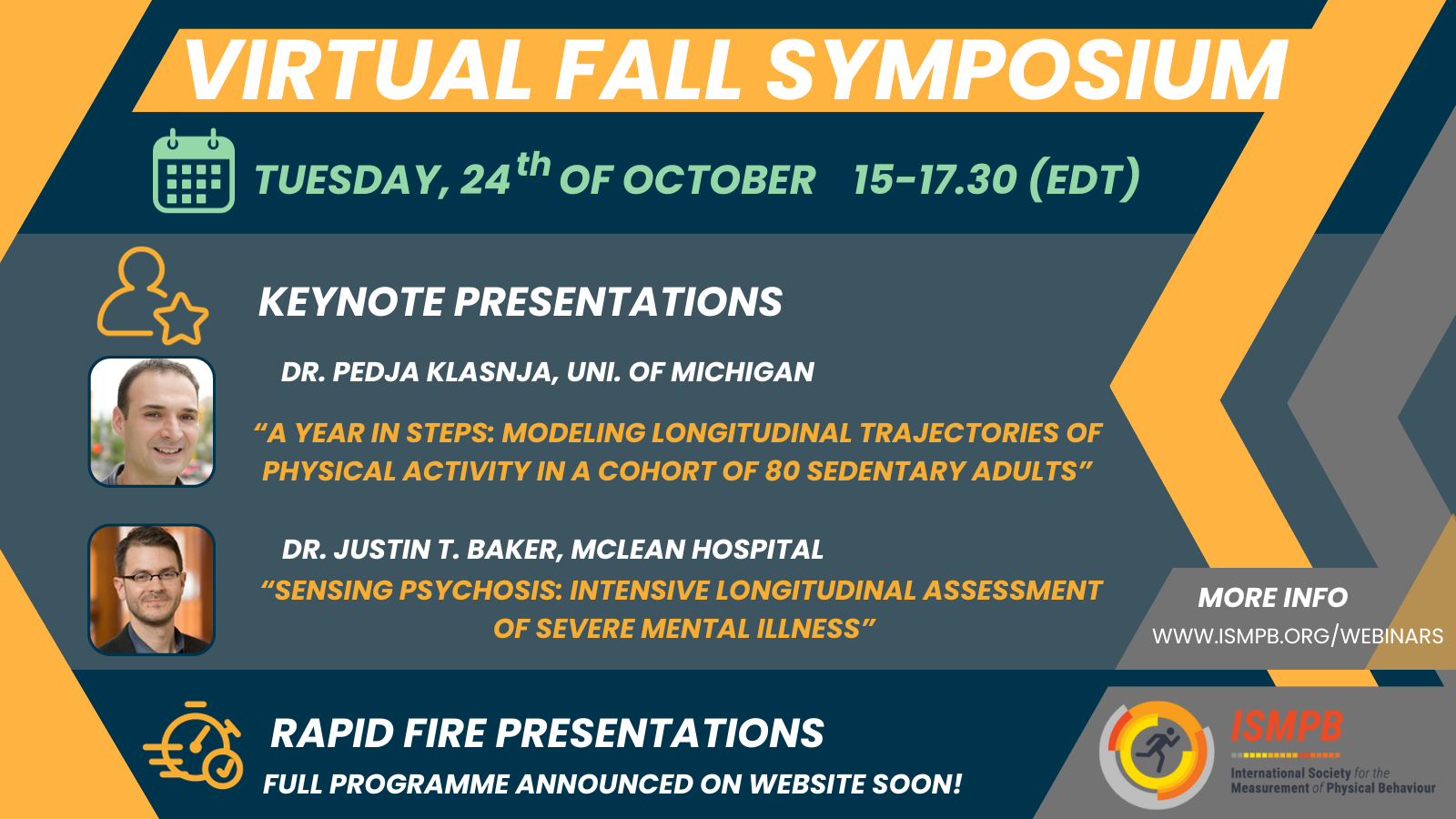
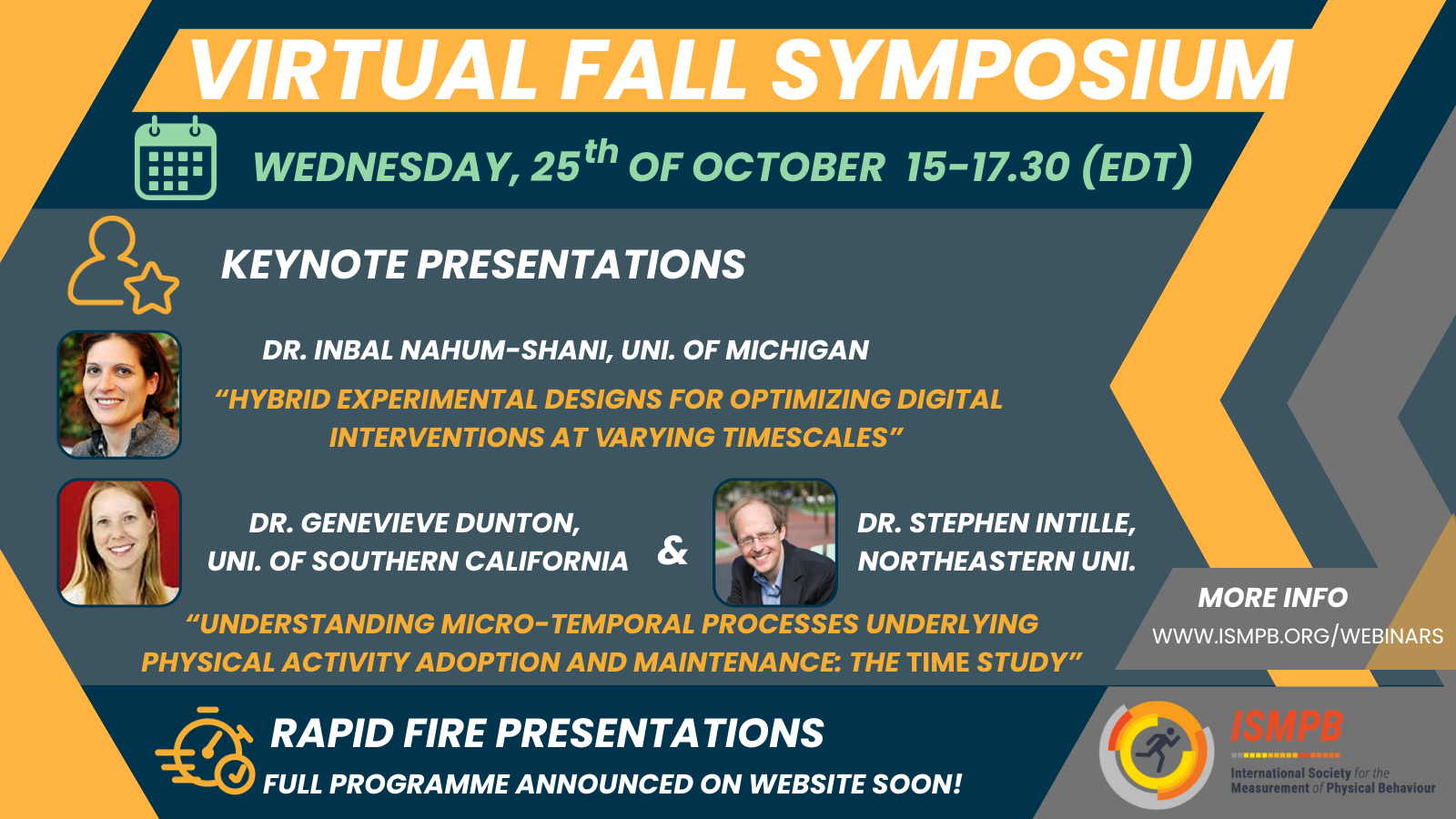
Virtual Fall Symposium
A Year in Steps: Modeling Longitudinal Trajectories of Physical Activity in a Cohort of 80 Sedentary Adults
Dr. Predrag “Pedja” Klasnja, University of Michigan
Sensing Psychosis: Intensive Longitudinal Assessment of Severe Mental Illness
Dr. Justin T. Baker, Mclean Hospital
Originally Presented on October 24th, 2023
Hybrid Experimental Designs for Optimizing Digital Interventions at Varying Timescales
Dr. Inbal Nahum-Shani, University of Michigan
Understanding Micro-Temporal Processes Underlying Physicial Activity Adoption and Maintenance: The Time Study
Dr. Genevieve Dunton, University of Southern California &
Dr. Stephen Intille, Northeastern University
Originally Presented on October 25th, 2023
Sponsored by SENS motion
Speaker BIOS
 Dr. Predrag “Pedja” Klasnja is an Associate Professor in the School of Information at the University of Michigan. His research lies at the intersection of human-computer interaction, behavioral science, and health informatics and he studies how technology can better enable people to manage their health in their day-to-day lives. As an implementation researcher, the central focus of his work is on the development of causal pathway diagramming, which is an approach to represent causal processes hypothesized to underlie the functioning of implementation strategies. This approach allows researchers and practitioners to select strategies that are most likely to impact prioritized determinants of behavior, uncover factors that may influence the effectiveness of these strategies, and determine the appropriate measurement variable, which indicates that the implementation initiative is working as intended. As part of the Intensive Longitudinal Health Behavior Network, he was a Co-Principal Investigator on the “Dynamic Models of Behavior Study” (https://ilhbn.ssri.psu.edu/projects/dmb-dynamic-models-behavior), which was a micro-randomized trial of a multi-component, multiscale, adaptive intervention to increase physical activity and sedentary behavior (https://www.si.umich.edu/people/pedja-klasnja).
Dr. Predrag “Pedja” Klasnja is an Associate Professor in the School of Information at the University of Michigan. His research lies at the intersection of human-computer interaction, behavioral science, and health informatics and he studies how technology can better enable people to manage their health in their day-to-day lives. As an implementation researcher, the central focus of his work is on the development of causal pathway diagramming, which is an approach to represent causal processes hypothesized to underlie the functioning of implementation strategies. This approach allows researchers and practitioners to select strategies that are most likely to impact prioritized determinants of behavior, uncover factors that may influence the effectiveness of these strategies, and determine the appropriate measurement variable, which indicates that the implementation initiative is working as intended. As part of the Intensive Longitudinal Health Behavior Network, he was a Co-Principal Investigator on the “Dynamic Models of Behavior Study” (https://ilhbn.ssri.psu.edu/projects/dmb-dynamic-models-behavior), which was a micro-randomized trial of a multi-component, multiscale, adaptive intervention to increase physical activity and sedentary behavior (https://www.si.umich.edu/people/pedja-klasnja).
 Dr. Justin T. Baker, MD, PhD, is the scientific director of the McLean Institute for Technology in Psychiatry (ITP) and director of the Laboratory for Functional Neuroimaging and Bioinformatics at McLean Hospital. Dr. Baker’s research uses both large-scale studies and deep, multilevel phenotyping approaches to understand the nature and underlying biology of mental illnesses. His current deep phenotyping projects use single-case experimental designs in individuals with severe conditions including bipolar disorder, schizophrenia, borderline personality disorder, and obsessive-compulsive disorder. By applying computational approaches, such as latent construct modeling, machine learning, and dynamical systems analysis, the data collected from each study—and each individual—can reveal key relationships to advance human neuroscience and develop novel, personalized therapeutics. His research studies involve the collection and analysis of temporally dense behavioral assessments to study neuropsychiatric conditions using an array of acquisition technologies and analytic approaches. As part of the Intensive Longitudinal Behavior Network (https://ilhbn.ssri.psu.edu/projects/bls-bi-polar-longitudinal-study), he was the Co-Principal Investigator on the “Bi-Polar Longitudinal Study”, which aimed to predict adverse events (mania/psychosis) prior to their occurrence via the detection of changes in behavior of at-risk patients. (https://www.mcleanhospital.org/profile/justin-baker).
Dr. Justin T. Baker, MD, PhD, is the scientific director of the McLean Institute for Technology in Psychiatry (ITP) and director of the Laboratory for Functional Neuroimaging and Bioinformatics at McLean Hospital. Dr. Baker’s research uses both large-scale studies and deep, multilevel phenotyping approaches to understand the nature and underlying biology of mental illnesses. His current deep phenotyping projects use single-case experimental designs in individuals with severe conditions including bipolar disorder, schizophrenia, borderline personality disorder, and obsessive-compulsive disorder. By applying computational approaches, such as latent construct modeling, machine learning, and dynamical systems analysis, the data collected from each study—and each individual—can reveal key relationships to advance human neuroscience and develop novel, personalized therapeutics. His research studies involve the collection and analysis of temporally dense behavioral assessments to study neuropsychiatric conditions using an array of acquisition technologies and analytic approaches. As part of the Intensive Longitudinal Behavior Network (https://ilhbn.ssri.psu.edu/projects/bls-bi-polar-longitudinal-study), he was the Co-Principal Investigator on the “Bi-Polar Longitudinal Study”, which aimed to predict adverse events (mania/psychosis) prior to their occurrence via the detection of changes in behavior of at-risk patients. (https://www.mcleanhospital.org/profile/justin-baker).
 Dr. Inbal Nahum-Shani is a Research Assistant Professor at the University of Michigan’s Institute for Social Research. Her research focuses on developing and employing behavioral theory and novel methodologies to construct adaptive interventions, namely interventions that modify the type, timing, dose, or delivery mode of support in order to address the unique and changing needs of individuals. She is an expert on deploying novel research methodologies including the Sequential Multiple Assignment Randomized Trial (SMART) design, related data analytic methods for constructing adaptive interventions, Factorial and Fractional Factorial Designs, and Multilevel Data Analysis and Experimental Designs for developing behavioral interventions. As part of the Intensive Longitudinal Health Behavior Network (https://ilhbn.ssri.psu.edu/projects), she was the Principal Investigator on the “Mobile Application for regulating Smoking study” (https://ilhbn.ssri.psu.edu/projects/mars-mobile-application-regulating-smoking), which aimed to identify states of vulnerability and receptivity to just-in-time interventions. The study employed methods for the joint modeling of EMA, location, motion sensors, and time to event as a function of underlying latent states (https://ihpi.umich.edu/our-experts/inbal).
Dr. Inbal Nahum-Shani is a Research Assistant Professor at the University of Michigan’s Institute for Social Research. Her research focuses on developing and employing behavioral theory and novel methodologies to construct adaptive interventions, namely interventions that modify the type, timing, dose, or delivery mode of support in order to address the unique and changing needs of individuals. She is an expert on deploying novel research methodologies including the Sequential Multiple Assignment Randomized Trial (SMART) design, related data analytic methods for constructing adaptive interventions, Factorial and Fractional Factorial Designs, and Multilevel Data Analysis and Experimental Designs for developing behavioral interventions. As part of the Intensive Longitudinal Health Behavior Network (https://ilhbn.ssri.psu.edu/projects), she was the Principal Investigator on the “Mobile Application for regulating Smoking study” (https://ilhbn.ssri.psu.edu/projects/mars-mobile-application-regulating-smoking), which aimed to identify states of vulnerability and receptivity to just-in-time interventions. The study employed methods for the joint modeling of EMA, location, motion sensors, and time to event as a function of underlying latent states (https://ihpi.umich.edu/our-experts/inbal).
 Dr. Genevieve Dunton is a Professor of Preventive Medicine and Psychology at the University of Southern California. Dr. Dunton´s research examines the etiology of health behaviors related to chronic disease risk in children and adults, with a focus on physical activity and nutrition. Dr. Dunton is the Director of the USC REACH (Real-Time Eating Activity and Children’s Health) lab, the goals of which are to develop, test, and apply real-time data capture methodologies, including EMA and wearable sensors, to better understand the effects of time-varying psychological, social, and environmental factors on eating and physical activity episodes. As part of the Intensive Longitudinal Health Behavior Network (https://ilhbn.ssri.psu.edu/projects/time-temporal-influences-movement-and-exercise), she was the Co-Principal Investigator on the “Time Influences of Movement and Exercise study,” which aimed to assess differences in the micro-temporal processes underlying the adoption vs. maintenance of physical activity and sedentary behaviors (https://keck.usc.edu/faculty-search/genevieve-dunton/).
Dr. Genevieve Dunton is a Professor of Preventive Medicine and Psychology at the University of Southern California. Dr. Dunton´s research examines the etiology of health behaviors related to chronic disease risk in children and adults, with a focus on physical activity and nutrition. Dr. Dunton is the Director of the USC REACH (Real-Time Eating Activity and Children’s Health) lab, the goals of which are to develop, test, and apply real-time data capture methodologies, including EMA and wearable sensors, to better understand the effects of time-varying psychological, social, and environmental factors on eating and physical activity episodes. As part of the Intensive Longitudinal Health Behavior Network (https://ilhbn.ssri.psu.edu/projects/time-temporal-influences-movement-and-exercise), she was the Co-Principal Investigator on the “Time Influences of Movement and Exercise study,” which aimed to assess differences in the micro-temporal processes underlying the adoption vs. maintenance of physical activity and sedentary behaviors (https://keck.usc.edu/faculty-search/genevieve-dunton/).
 Dr. Stephen Intille is an Associate Professor in the Khoury College of Computer Sciences and the Bouve College of Health Sciences at Northeastern University. He leads a multi-disciplinary research team exploring the application of advanced sensing and mobile technologies to preventive health domains. An area of interest is the measurement of health-related behaviors, such as physical activity, sedentary behavior, and sleep, as well as measurement of eating behaviors and other contextual factors and affective states, often via context-sensitive self-report. He is experienced in deploying and evaluating systems in a variety of domains where automatic pattern recognition algorithms may support novel preventive health technologies that measure health behavior and motivate health behavior change with “just-in-time” information presentation. As part of the Intensive Longitudinal Behavior Network (https://ilhbn.ssri.psu.edu/projects/time-temporal-influences-movement-and-exercise), he was the Co-principal investigator on the “Time Influences of Movement and Exercise study,” which aimed to assess differences in the micro-temporal processes underlying the adoption vs. maintenance of physical activity and sedentary behaviors (https://www.khoury.northeastern.edu/people/stephen-intille/).
Dr. Stephen Intille is an Associate Professor in the Khoury College of Computer Sciences and the Bouve College of Health Sciences at Northeastern University. He leads a multi-disciplinary research team exploring the application of advanced sensing and mobile technologies to preventive health domains. An area of interest is the measurement of health-related behaviors, such as physical activity, sedentary behavior, and sleep, as well as measurement of eating behaviors and other contextual factors and affective states, often via context-sensitive self-report. He is experienced in deploying and evaluating systems in a variety of domains where automatic pattern recognition algorithms may support novel preventive health technologies that measure health behavior and motivate health behavior change with “just-in-time” information presentation. As part of the Intensive Longitudinal Behavior Network (https://ilhbn.ssri.psu.edu/projects/time-temporal-influences-movement-and-exercise), he was the Co-principal investigator on the “Time Influences of Movement and Exercise study,” which aimed to assess differences in the micro-temporal processes underlying the adoption vs. maintenance of physical activity and sedentary behaviors (https://www.khoury.northeastern.edu/people/stephen-intille/).

NHANES 2011-2014 Physical Activity Monitor data – now FREE!
Speaker:
Richard P. Troiano, Ph.D.
CAPT, U.S. Public Health Service
NIH Program Director, Risk Factor Assessment Branch of the Epidemiology and Genomics Research Program in NCI’s Division of Cancer Control and Population Sciences (DCCPS)
Dr. Troiano worked with the NHANES to implement the use of devices in the survey to obtain objective measures of participants’ physical activity-related movement and sleep, as well as body strength. His presentation will be dedicated to the release of the activity monitor data for 2011-2014.
Originally Presented on January 28, 2021

Mutual understanding of physical behaviors across scientific disciplines
Facilitators:
Andreas Holtermann, National Research Center for the Working Environment Copenhagan
Ulf Ekelund, Norwegian School of Sport Science
Svend Erik Mathiassen, University of Gavle
Bente Klarlund Pedersen, University of Copenhagen
Örjan Ekblom, The Swedish School of Sport and Sciences
Jorunn Helbostad, Norwegian University of Science and Technology
Originally presented October 8th, 2020
The objective of this session is to facilitate a mutual understanding of physical behaviors (physical activity, sedentary behavior, sleep) across scientific disciplines and promote collaboration on integrated research. Presentations will cover the basic view and the ‘key elements’ of physical behaviors from a panel of experts in public and occupational health, physical activity and sports medicine, exercise science and clinical and rehabilitation science.
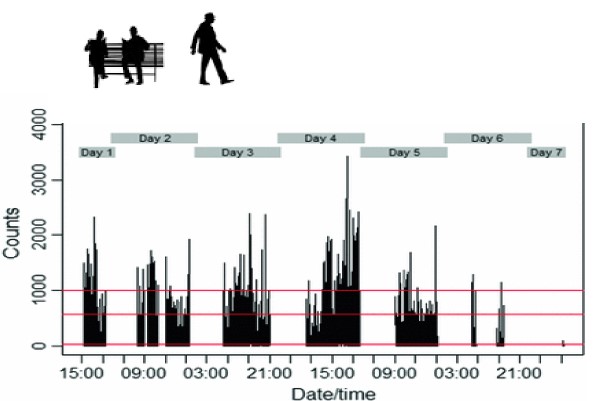
Assessing Physical Activity for Beginners – in the view of different perspectives
Facilitator: Associate professor Örjan Ekblom, The Swedish School of Sport and Health Sciences
Originally presented October 16th, 2020
The objective of this session is to introduce device-based assessment of physical activity pattern and provide details for a first data collection. The presentation will cover rationale and perspective of using accelerometry for your studies as well as a crash course on how the data looks like and traditional analysis.
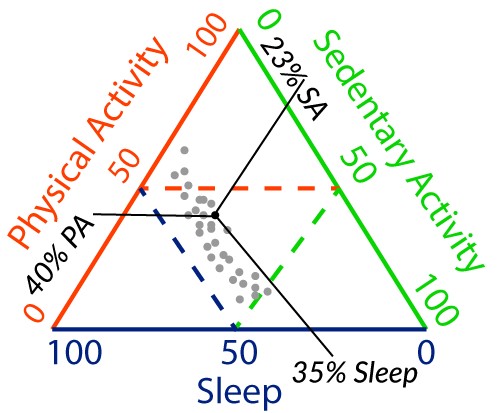
Compositional data analysis (CoDA): The whys, the hows and future applications of CoDA in physical behavior research
Facilitator and speakers:
Nidhi Gupta, National Research Center for the Working Environment Copenhagen
Charlotte Lund Rasmussen, National Research Center for the Working Environment Copenhagen
Svend Erik Mathiassen, Department of Occupational Health Sciences and Psychology, University of Gavle
Sebastien Chastin, Glasgow Caledonian University
Originally Presented October 26th, 2020
The objective of this session is to introduce participants to the basic steps of CoDA, and how to use CoDA in their own research. A panel of experts will guide you through the rationale, basics and examples of CoDA. Challenges and potential for future applications will be discussed.

